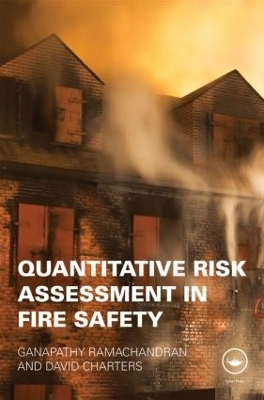
Quantitative Risk Assessment in Fire Safety
Taylor & Francis Ltd (Verlag)
978-0-419-20790-0 (ISBN)
Fire safety regulations in many countries require Fire Risk Assessment to be carried out for buildings such as workplaces and houses in multiple occupation. This duty is imposed on a "Responsible Person" and also on any other persons having control of buildings in compliance with the requirements specified in the regulations.
Although regulations only require a qualitative assessment of fire risk, a quantitative assessment is an essential first step for performing cost-benefit analysis of alternative fire strategies to comply with the regulations and selecting the most cost-effective strategy. To facilitate this assessment, various qualitative, semi-quantitative and quantitative techniques of fire risk assessment, already developed, are critically reviewed in this book and some improvements are suggested.
This book is intended to be an expanded version of Part 7: Probabilistic risk assessment, 2003, a Published Document (PD) to British Standard BS 7974: 2001 on the Application of Fire Safety Engineering Principles to the Design of Buildings. Ganapathy Ramachandran and David Charters were co-authors of PD 7974 Part 7.
Quantitative Risk Assessment in Fire Safety is essential reading for consultants, academics, fire safety engineers, fire officers, building control officers and students in fire safety engineering. It also provides useful tools for fire protection economists and risk management professionals, including those involved in fire insurance underwriting.
Ganapathy Ramachandran, PhD, DSc, FIFireE, MSFPE, held senior scientific appointments for 23 years (1965–1988) at the Fire Research Station, Borehamwood, Herts, UK. Since retiring in November 1988, he has been practising as a private consultant mainly in research problems in the application of statistical, probabilistic and economic techniques to fire risk evaluation, fire protection engineering and fire insurance. He is the author of Economics of Fire Protection (1998) and co-author of Evaluation of Fire Safety (2004). He is currently a Visiting Professor at the University of Leeds, UK. He has more than 45 years of experience in the field. David Charters, PhD, CEng, MIMechE, FIFireE, MSFPE is Director of the Fire Engineering Analysis Group at BRE. He previously held the position of Director at Arup Fire, and has more than 23 years experience in the field. He is a past president of the Institution of Fire Engineers, and is currently a Visiting Professor in Fire Risk Analysis at the University of Ulster, UK.
1. Introduction 2. Qualitative and Semi-quantitative Risk Assessment Techniques 3. Quantitative Risk Assessment Techniques 4. Acceptance Criteria 5. Initiation 6. Design Fire Size 7. Fire Spread Beyond Room of Origin 8. Performance and Reliability of Detection, Alarm and Suppression 9. Performance and Reliability of Human Response and Evacuation 10. Performance and Effectiveness of Fire Service Intervention 11. Whole Project Analysis 12. Interactions 13. Combining Data from Various Sources – Bayesian Technique
| Erscheint lt. Verlag | 17.2.2011 |
|---|---|
| Zusatzinfo | 52 Tables, black and white; 48 Line drawings, black and white; 12 Halftones, black and white |
| Verlagsort | London |
| Sprache | englisch |
| Maße | 156 x 234 mm |
| Gewicht | 870 g |
| Themenwelt | Naturwissenschaften ► Biologie ► Ökologie / Naturschutz |
| Technik ► Bauwesen | |
| ISBN-10 | 0-419-20790-2 / 0419207902 |
| ISBN-13 | 978-0-419-20790-0 / 9780419207900 |
| Zustand | Neuware |
| Haben Sie eine Frage zum Produkt? |
aus dem Bereich


